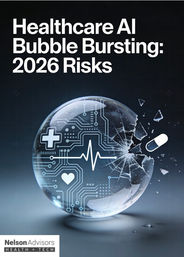Powerful Patients, Paperless Systems : How new Technology can renew the NHS
- Alan Mak MP
- May 1, 2018
- 5 min read

Foreward by By the Rt Hon Jeremy Hunt MP
Across the world, new technology is transforming healthcare, with medical innovations set to transform humanity in the next 25 years in the same way as the Internet has done in the last 25. The breakthroughs, disruption and progress we have seen in other walks of life are now sweeping through healthcare, and we can ensure our NHS harnesses their benefits like no other healthcare system.
As I set out last year in a speech at the Health and Care Innovation Expo, the “master-servant” relationship between doctors and patients is being vanquished by new technology. Control will soon be at the fingertips of patients through smartphones and computers, while clinicians will be granted more freedom and assistance by the technologies at their disposal.
My ambition is to harness that potential to ensure patients can benefit from a truly digital NHS, ushering in a new era of patient power.
As Alan Mak sets out in this excellent report, by embracing the future, the NHS can continue to flourish for the next 70 years and beyond. Staff and patients are often at the sharp end of driving this change and the Government is doing its bit by providing the necessary vision, policy framework and funding. Through the Personalised Health and Care 2020 Programme we are spending £4.2 billion bringing hospital IT and online services for patients up to date.
Our plans to improve patient choice and access through technology include the new NHS app – which will enable patients to access a number of digital services through a single app including the ability to book appointments, contact the online 111 service, order repeat prescriptions, and access and add to their GP record, as well as control how their personal data is used beyond their direct care.
This report makes a clear and consistent argument that the healthcare of tomorrow will be driven by big data, AI, automation and connectivity, which is why the NHS must be a global leader in these fields. Much work is already under way, delivering the vision of the Life Sciences Industrial Strategy and Personalised Health and Care 2020.
The first Life Sciences Sector Deal was published on 6th December, and includes action related to research, the technologies of the future and the evolution of clinical trials, alongside substantial government support for direct and indirect investment to support growth. The deal will draw in substantial investment to the technology and life sciences sectors, ensuring that the next wave of breakthrough treatments, innovative medical research and technologies, and highly skilled jobs are created in Britain and harnessed by the NHS.
While ensuring that the NHS is fit for the future is a key priority, we know that improvement is a continuous process. That’s why I welcome new ideas from parliamentary colleagues – including many of the recommendations in this report – and innovative platforms such as the CPS’s “New Generation” project which help develop policies that deliver a better future for us all.

The Report
Click here to read in full - https://www.alanmak.org.uk/sites/www.alanmak.org.uk/files/2018-05/Alan%20Mak%20MP%20-%20CPS%20NHS%204IR%20Report%20-%20FINAL.pdf
As the 4IR accelerates, there is no other sector or policy area where new technology has such unqualified transformative potential as in healthcare.
Smartphone apps, video consultancy, AI, VR, AR, personalised medicine and robotics will all fundamentally redefine the relationship between doctor and patient – and transform the way the NHS works.
As this report makes clear, there are several recommended steps that the NHS must take to benefit from the 4IR, but with its wealth of data, history of innovation and committed staff, it is well placed to do so. Shedding outdated technology such as fax machines and pagers must be a priority, and the introduction of an integrated app such as NHS NOW can put data, and therefore power, back into the hands of patients.
Delivering Jeremy Hunt’s ambition for a “decade of patient power” is tantalisingly within reach, but to realise that ambition, the patient must be put at the heart of every decision taken to improve the NHS in the coming years. Patients should have control over their health and wellbeing, be involved in every stage of their treatment, and have the facts and figures they need to make informed choices. After all, this is already the case in every other aspect of their
lives as consumers and citizens.
Equally, a fully digital NHS will finally eliminate paper, saving the taxpayer billions of pounds a year through improved connectivity within the Health Service, resulting in better efficiency, care and health outcomes. As the Government develops a long-term funding deal for the NHS, it should place innovation and patient power at the heart of its plans. Only by doing so can we renew the NHS for the years ahead, and strengthen the Conservatives’ position as the party that voters trust as stewards of the Health Service.
If you are interested in the Fourth Industrial Revolution, please contact me to see how you could get involved in the 4IR APPG, for example as a Parliamentary supporter, industry sponsor, or as a representative of the media, business, academia, or investor community. We welcome interest from all sectors. As I have consistently said throughout this report – and in my wider work on this topic over the last two years – ensuring Britain leads the 4IR is the greatest political and economic opportunity of our generation. If we seize those opportunities, both in the NHS and beyond, we can build a country that is not just t for the future, but one that gets to the future rst.

About the Author
Alan Mak was elected as the Conservative Member of Parliament for Havant in May 2015, succeeding former Cabinet Minister David Willetts, and re-elected in June 2017.
He led the first ever debate on the Fourth Industrial Revolution (4IR) in Parliament in September 2016, founded the APPG on the 4IR in October 2016 and formally launched it in March 2017 with the Chancellor, Philip Hammond. Alan’s main political interests are the economy, technology and social mobility. He is also Co-Chairman of the APPGs for Entrepreneurship, and for Apprenticeships; and Chairman of the 1922 Committee’s International Trade Policy Sub-Committee. Alan is currently Parliamentary Private Secretary (PPS) to the Secretary of State for Business, Energy & Industrial Strategy, having previously served as a PPS in the Ministry of Justice.
Before his election, he started and ran his own business, having begun his career at Clifford Chance LLP in the City advising some of the world’s largest businesses. He has invested in a number of tech start-ups. Alan was born and grew up in York, and read law at Peterhouse, Cambridge University where he won the ECS Wade Prize for Administrative Law.
E: alan.mak.mp@parliament.uk
Tw: @AlanMakMP




















































Comments